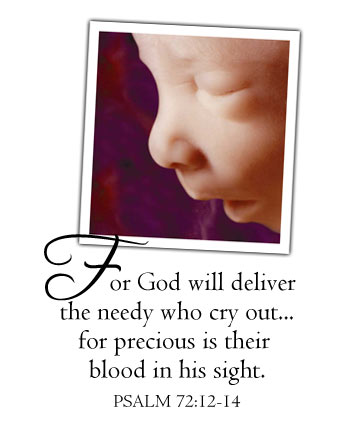It bothers me when there is so much talk about abortion. I’m prolife, but what about all the innocent children killed in war, those who die of malnutrition, those who are being abused, etc.? Shouldn’t Christians be just as concerned about these living children?
(I’m including the 3-minute video answer to this question at the bottom of my post. However, the transcript has been edited and added to, so feel free to watch the video but I’d encourage you to start by reading the written version.)
 This is a good question. However, I admit I’ve been asked something similar so often that I cringe a bit when I see it, and here’s why: I think people are creating an artificial distinction because they feel that whenever you talk about one social evil and injustice, you are obligated to list every other one. I don’t agree with that. And I don’t appreciate the fact that this is seldom done with other injustices, but is routinely done with abortion. (Though I’ve often spoken about other injustices, whenever I address abortion I get multiple comments from people asking why I’m not addressing other problems.)
This is a good question. However, I admit I’ve been asked something similar so often that I cringe a bit when I see it, and here’s why: I think people are creating an artificial distinction because they feel that whenever you talk about one social evil and injustice, you are obligated to list every other one. I don’t agree with that. And I don’t appreciate the fact that this is seldom done with other injustices, but is routinely done with abortion. (Though I’ve often spoken about other injustices, whenever I address abortion I get multiple comments from people asking why I’m not addressing other problems.)
When I see people concerned about the horrors of child abuse, or the selling of children into sexual slavery, it never occurs to me to say, “Now, wait a minute! Why aren’t you talking about abortion?”
Certainly it’s okay for different people to have certain burdens on their heart. Of course, I hope those people are concerned about abortion too. But do I expect them to talk as much about abortion as they do about sex trafficking? No, of course not. What about people who are concerned about malnutrition and childhood diseases? What about hunger? What about poverty in underdeveloped countries? Do I go to the relief organizations and say, “Well, wait a minute! You didn’t say anything about abortion!” No. I don’t assume someone’s a hypocrite just because they’re talking about one group of needy children and not another. Good for them that they’re speaking up for whomever God has laid on their hearts. Now, sometimes these groups are somehow justifying abortion, or have policies that are promoting abortion. Sometimes they support Planned Parenthood, a group which makes 51% of its income from performing abortions. In those cases, it needs to be addressed. But I would never criticize someone for speaking up more for some needy people than others.
It reminds me of a time several years ago when some of us were standing outside an abortion clinic holding signs that said “Choose life” and “Abortion Kills Children.” A female reporter and a cameraman from one of the local news stations came up to me and she said, “You’re standing out here and opposing abortion. But what are you doing for children who have already been born?”
I said, “Well, we opened our home to a teenage girl who had been kicked out of her home. She lived with us and we supported her financially and helped her place her child up for adoption. And since you asked, a significant portion of our monthly income goes to helping the poor and needy in other parts of the world. In fact, we give away all the royalties from my books.” (By the way, I would say of the seven million dollars or so that has been given away by our ministry in the last number of years, probably two million has gone to help children and their families in poverty, as well as to orphanages and helping street orphans and victims of sexual abuse.)
As I was explaining those things, she signaled the cameraman to turn off the camera. Obviously she was interested in moving on to talk to someone else. But I continued and said, “Actually, standing here next to me is Rick Norquist.” I called him over and explained that at the time he and his wife Janet had adopted something like nineteen children, a number of whom had Down Syndrome and several were very hard to place children.
I didn’t actually say the words to the interviewer, but I was thinking, “So how many of these children have you adopted, or how much of your income are you giving away to help needy children?” But by this time the reporter had moved on to spring the question on someone else, who she hoped would have to admit that they really don’t do anything to help children once they are born.
I find there is a common preconceived notion that prolife people don’t care about already born children. In fact, people concerned about abortion are often the very same people who open their homes to provide foster care, adopt, and give financially to help the impoverished and the needy.
Often I hear things like, “You’re talking about abortion, but what about children killed in war?” I do believe there is such a thing as just war, with World War II being a prominent example. Were children killed in that war? Tragically, yes. But I believe this world would be a far worse place today if Americans and others had not fought in that war.
But I also believe that when there is just war, great care should be taken to keep that war just and to protect innocent children. When children are casualties and greater care could have been taken to prevent that, it is heartbreaking.
So to those who believe insufficient efforts are being taken by American forces to protect children in Iraq and Afghanistan—by all means, speak up about this. I have never once gone to your websites and asked you why you never say anything about protecting the children we’re killing by abortion. Yet every time I say something about the unborn, those people ask me why I’m not addressing war.
What people usually are doing when they bring up the other concerns is minimizing the issue of abortion. When people say, “What about this issue?” my response is, “Well, I’m concerned about that, too. But that wasn’t what we were talking about. We were talking about abortion. You say you are prolife, what are you doing to help innocent, unborn children? Are you voting for candidates who support abortion? If so, why? Would you also vote for people who support sex trafficking?”
Here’s what Scripture says about the shedding of innocent blood, which is what I want to bring to the attention of all the people who are continuously making those comments (some of whom are sincere, and some of whom are just trying to change the subject away from the killing of preborn children). Leviticus 18:21 says, “Do not give any of your children to be sacrificed to Molech for you must not profane the name of your God. I am the Lord.”
 Molech was a false God, an idol. To offer sacrifices to him, they literally would light a fire inside the metallic false god until his arms were white hot, and lay live babies, screaming in agony, upon them.
Molech was a false God, an idol. To offer sacrifices to him, they literally would light a fire inside the metallic false god until his arms were white hot, and lay live babies, screaming in agony, upon them.
What does that tell you about Satan and his hatred of children? He is the father of lies and a murderer from the beginning. God’s Word is full of Scriptures about the shedding of innocent blood. Here’s another: “Do this so that innocent blood will not be shed in your land, which the LORD your God is giving you as your inheritance, and so that you will not be guilty of bloodshed” (Deuteronomy 19:10).
I think there is nothing worse in God’s sight than the killing of innocent children, including the unborn. They have no chance against the adults armed with metallic instruments that tear them apart. Scripture says, “Speak up for those who cannot speak for themselves. Defend the rights of the poor and needy” (Proverbs 31:9).
That is why we speak up on behalf of children who are dying from abortion. I don’t apologize for that. Should we speak up for children who are born? Absolutely. But that should not keep us from speaking up for the smallest of these children—who Christ called, “the least of these, his brethren” which is by no means limited to unborn children, but certainly includes them.
And to the many social justice Christians who advocate for all the needy except unborn children, may I suggest that you also occasionally try speaking up for that one group of innocent people that will make you unpopular instead of cool? Try speaking up for those who rock stars and Hollywood will never speak up for. It’s not trendy to speak up for the unborn, but God loves these little children who He created in his image. And if God loves them, shouldn’t we?
Image by Aamir Mohd Khan from Pixabay





